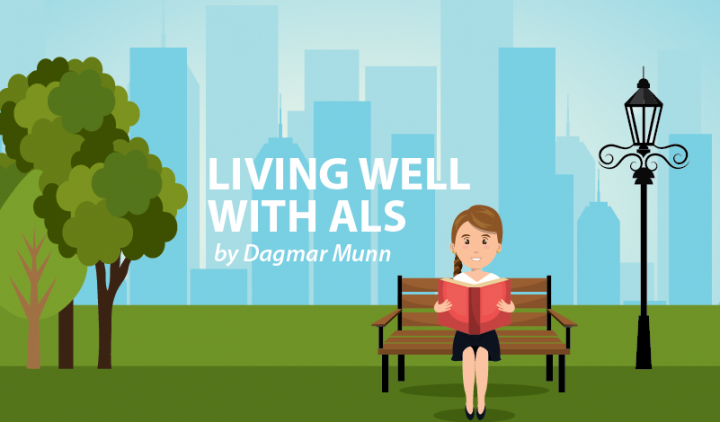The 4 Ms: My Formula for Daily Living

When I was diagnosed with ALS in 2010, my doctor told me there was one medication available to help slow the progression of the symptoms. But there was no cure. I left her office with a prescription for Rilutek (riluzole), the first treatment approved by the U.S. Food and Drug Administration to treat ALS.
But I was disappointed and frustrated that nothing else existed for newly diagnosed patients like me.
My professional career included nearly 30 years of running a hospital-based wellness center. In the nine years since my diagnosis, I have followed a simple formula for daily living based on the wellness principles I once taught to others.
In addition to taking my medication and seeing my doctor, I keep my thoughts in the here and now, exercise daily, and practice optimism. Imagine my delight when I discovered several studies validating the components of my plan.
I call my plan the “4 Ms.” Medication, mindfulness, motion, and mood. Let me explain:
- Medication: Follow your doctor’s advice, and take all prescribed medications. These will help delay and manage your ALS symptoms.
- Mindfulness: A four-month study of 197 ALS patients concluded that the practice of active mindfulness decreases anxiety, depression, and disease progression. It also predicted a higher quality of life for patients who practice mindfulness. When I notice my thoughts straying toward future worries, I stop, take a slow breath in and out, and notice my surroundings. Practicing mindfulness has helped me feel that I am in control, have more awareness, and that I am moving safely.
- Motion: Moderate exercise can be beneficial for ALS patients. A recent study in a mouse model of ALS showed that exercise lessened molecular changes. A separate study showed that it improves lifespan and eases ALS symptoms. In addition to short daily exercise routines scattered throughout my day, I build movement into simple activities.
- Mood: A study of 224 ALS patients associated higher levels of emotional well-being with a slower progression of the disease. Facing life’s curveballs can easily bring down my mood. When I notice that I’m having trouble coping with change, I ask myself what has changed, what I need to do, or who can help me.
Why don’t you talk to your doctor and see if my plan would be a good fit for you? Maybe the 4 Ms will help you continue to live well while living with ALS.
***
Note: ALS News Today is strictly a news and information website about the disease. It does not provide medical advice, diagnosis, or treatment. This content is not intended to be a substitute for professional medical advice, diagnosis, or treatment. Always seek the advice of your physician or other qualified health provider with any questions you may have regarding a medical condition. Never disregard professional medical advice or delay in seeking it because of something you have read on this website. The opinions expressed in this column are not those of ALS News Today or its parent company, Bionews Services, and are intended to spark discussion about issues pertaining to ALS.







Michael Meyer
I do agree with all your M's except the M for "Medication". I do not think that medical science has done anything yet to help this condition and I also noticed that patients non-compliant with advice from so-called "ALS professionals" often fare better. This, btw, seems to apply to many medical disorders, espacially those of neurological nature. I cannot wait to see the overdue and much needed quantum leap in medical science to happen to free us diseases as cruel as ALS.
Klara Weis
Dagmar, you gave us last year an idea of how you keep your voice from deteriorating. My son who is 43 with four young children is starting to lose his voice. I know you have exercises you do. Would you please share them so that I can pass them on to my son? Thank you, Klara Weis
Dagmar Munn
Hello Klara, I have written much about my vocal experiences ;-) I suggest these links, plus I have just posted an extensive explanation in the ALS News Today Forum.http://alsnewstoday.com/forums/
https://alsandwellness.blogspot.com/2018/03/als-dysarthria-use-these-innovative.html
https://alsandwellness.blogspot.com/2020/01/how-blowing-bubbles-helps-me-breathe.html
Klara Weis
Dagmar, thank you very much. I will look into all of these and send on to my son.......Keep Safe, Klara
Patty Lavernuick
On medication: I am newly diagnosed 2.5 months ago. I started riluzole but felt more fatigued,fasciculations, and some pain began in ankle and upper arm., so I quit meds on my own. Less fatigue and just about no fasciculations. What are your views on this.
Dagmar Munn
Patty, I'm not qualified to give you medical advice, but I think you didn't give your medications enough time. Only 2.5 months is too short to make an assessment. Riluzole is not like taking aspirin and expecting results within a few hours. Plus, what you are feeling might just be congoing and progressing ALS symptoms. Rather than self-treating, I recommend you discuss your decisions and symptoms with your physician.